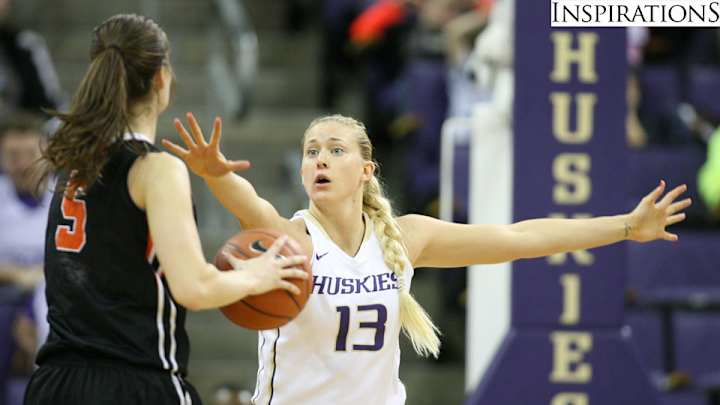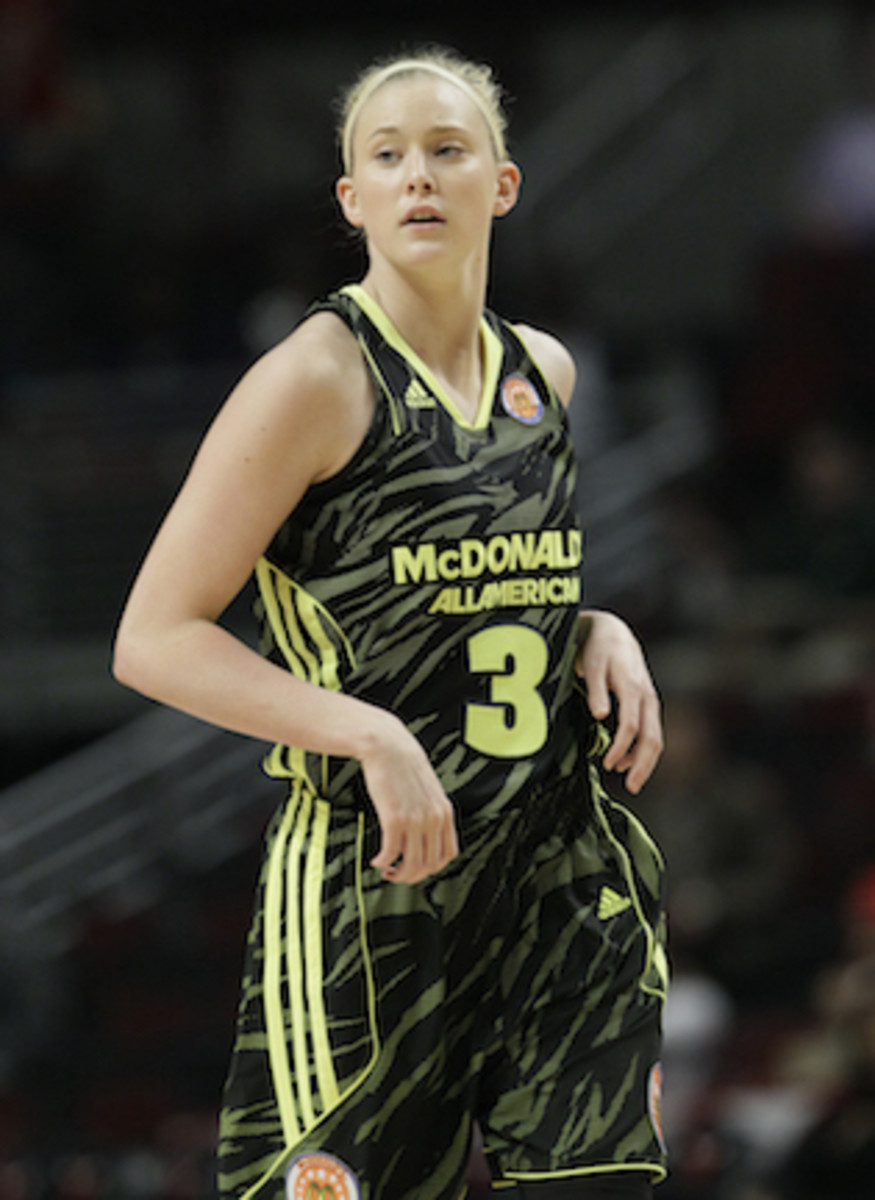Katie Collier overcomes cancer, knee injury to fulfill basketball dream at UW

SEATTLE—On her worst day of leukemia treatment, Katie Collier had a port put her chest early one morning and chemotherapy administered just hours later, her skin so sensitive and raw that she wept. On her worst day of her recovery from a torn ACL, her crutch missed a stair. She stumbled and caught herself, dissolving into tears not because she got hurt, but because she was so damn sick of fighting.
Today, Collier comes off the bench for a Washington team hovering around the Top 25, as the Huskies are poised to make their first NCAA tournament since 2007. A 6’3” redshirt sophomore forward, Collier plays 11 minutes a game, averaging three points and grabbing two rebounds. If her numbers seem underwhelming, says UW assistant Kevin Morrison, then you have to look deeper.
“You don’t hear the word ‘cancer,’ then hear stories like this,” he says. “There are thousands of players who couldn’t come back from something like cancer. Then to tear your ACL, too? Come on. She’s the best story in basketball.”
*****
On Sept. 24, 2011 Collier, then 18 years old, was on her official visit to Washington, when she woke up with blood on her pillow and in her mouth. Her gums were bleeding, and she had no idea why. She called her parents, Ann and Mark, and asked them to come pick her up. There would be no tailgating, and no football game. She felt awful and wanted to go home. Months later, her parents confessed they wondered if she was exaggerating because she wasn’t enjoying the visit.
Back home in Covington, Wash., located 30 miles south of Seattle, Katie napped for nearly six hours. As she slept, Ann, a longtime nurse, typed “bleeding gums” into Google. Leukemia popped up as a possible cause.
• MORE CBB: UConn women back at No. 1 in AP poll
“It takes a lot for me to panic,” Ann says. “My first thought was, ‘she has strep throat and broke a blood vessel. She’s so healthy. Obviously it’s not leukemia.’”
When Katie woke, the family decided they needed to go to the ER. When nurses saw Katie with napkins stuffed in her mouth and soaked with blood they immediately took her to a room. Within a few hours, tests confirmed their worst fears: Katie had acute promyelocytic leukemia and would require immediate treatment. Suddenly, Ann remembered a stat from her Internet research: life expectancy for leukemia patients is often less than five years.
“That,” Ann says, “is when the panic started to set in.”
Katie was rushed by ambulance to UW hospital, arriving around 1 a.m. Sunday. Doctors gave her platelets to stop the bleeding, and a blood transfusion to replenish her body. Briefly alone with her doctor, Katie asked if she was going to die.
“If we can get you to survive the next 48 hours,” he told her, “you’ll be O.K.”
Then: “You’ll probably never play basketball again.”
*****

Ann still has the prescription pad where Dr. Elihu Estey scribbled the words “Katie is allowed to do whatever she wants,” the note required by Seattle Christian High before Katie could participate in basketball again. Katie started journaling after her diagnosis and in her first entry, wrote down her No. 1 goal: Play in November. Considering what happened immediately after her diagnosis, it seemed unrealistic to almost everyone around her.
On the second day of her hospital stay, she caught a cold and, because of her weakened immune system, had to be put in isolation. Everyone who entered her room had to wear a gown, mask and gloves. She stayed for a week, and started daily arsenic drip chemotherapy. After 21 days of initial treatment, she started a six-month program alternating chemo and oral medication.
Chemo robbed her of energy and weight, but Katie joined the team in December, playing in 18 of the Warriors’ 28 games and averaging 16 points, 11 rebounds and four blocked shots. Getting elbowed in the chest—a rite of passage for any post player—“hurt like a son of a gun,” because of her port. Ann flinched every time she hit the ground. Leukemia patients bruise easily, and Katie came home with new marks almost every day. “I don’t think I ever told her this, but I didn’t want her to go back and play,” Ann says.
She refused to let cancer define or control her. She smiled constantly, made friends with nurses and told everyone “I’m good!” when they asked how she felt, even if she had just spent the past 10 minutes laying on the bathroom floor throwing up. When her best friend, Catie Shelton, whined about homework, then said she felt guilty for complaining about something so trivial, Katie waved it away. “Cancer or not, homework does suck,” she told her friend. Few knew that some days, she was in so much pain she struggled to walk down the stairs. The youngest of five children, Katie leaned on her older sister Megan for support, and jokes.
“We’ve got to give Megan the credit,” Mark says. “She’s completely selfless, just awesome. She can be in the background as support, doesn’t need any spotlight or attention. She didn’t let Katie out of her sight, sat with her at every appointment and made her laugh.”
It sounds ridiculous, Katie says, but she and Megan actually had fun at chemo appointments watching TV, trading inside jokes and “talking about all that sister stuff,” Megan says. Giggles spilled out from her room, where friends and family were frequent visitors. Recalls Mark: “There were points when we asked the hospital staff, Are we breaking protocol here? Is it supposed to be somber?”
*****

The dread that often accompanies cancer, chemo and radiation didn’t overtake the Collier family like it could have, partially because it’s a fear with which they were familiar. Ann had battled breast cancer for three years after being diagnosed in February 2008, surviving 11 surgeries.
“When you first get diagnosed, it’s ‘How am I going to get through this? How do I get an oncologist?’” Ann says. “When Katie had those questions, we had answers.”
Before her diagnosis, Katie had whittled her list of colleges to Washington, UCLA and Gonzaga. Despite her condition, all three schools honored their scholarship offers, and each head coach assured Katie that they did not care if she ever played basketball again. She grew especially close with Morrison, who started recruiting Katie when she was 14 when he was an assistant at Cal. Morrison describes watching Katie navigate her cancer journey as “emotional, inspirational and just awesome.” In November 2011, she committed to Washington.
“As a kid, I grew up dreaming of playing for the Huskies but then when you get recruited you start thinking maybe you want to go somewhere else,” Katie says. “For me, getting sick was confirmation I was supposed to be at UW.”
The decision came with an added benefit: Seattle Cancer Care, where Katie received treatment, was within walking distance of campus and UW Medicine is considered one of the top hospitals in the country. Relieved their little girl would be close and have access to premium care whenever necessary, Ann and Mark approved of the choice.
In March 2012, Katie completed her final round of chemo, then headed to Chicago for the McDonald’s All-American game. Declared cancer-free in April, she arrived at UW in late June for summer school basketball workouts. On July 30, the first day of open gym, she faked baseline, went middle and heard her right knee pop. She tore her ACL, MCL and meniscus.
On the road recruiting, Morrison got a text message with the news.
‘This kid,” he thought, “cannot catch a break.’”
*****
Sidelined for more than a year—she had surgery in September 2012 and wasn’t cleared by trainers until October 2013—Katie had extra time to recover from chemo, let her immune system build back up and put on muscle. She watched from the bench as Washington recorded its second back-to-back 20-win season in almost two decades, falling in the second round of the WNIT.
“This is going to sound crazy,” she says, “but in some ways, the knee recovery was harder than cancer. I played with cancer. But with my knee, I just sat around.”
Kelsey vs. Kelsey: Buckeyes' Mitchell, Huskies' Plum lighting up scoreboards
On her worst days—like when she stumbled on the stairs—she called her sister Megan, who offered a balance of sympathy and tough love. Megan says she was responsible for “getting the giggles out of her,” telling Katie an inside joke or two to help take her mind off that day’s struggle.
Limited on the court but not in the weight room, Katie focused on adding strength to her lower body and broadening her shoulders. When she returned, she started the first game of her college career, scoring five points and grabbing six boards in the Huskies’ 91-81 loss at Saint Mary’s to open the 2013-14 season. She shed her bulky knee brace midway through last season and now, Morrison says, “is back to the Katie we knew in high school.”
“As a mom, I can get frustrated, asking stuff like why isn’t she playing more minutes?” Ann says. “But then I think about, we just wanted her to live. Any minute she’s alive, any minute she gets to play, it’s a complete blessing. The fact that she’s strong and healthy, basketball is just icing on the cake.”
Adds Mark: “I watch her and think about how she was supposed to be at some children’s hospital, not playing basketball at UW. That’s what people told us. Every time she walks on the floor, I think about the victories she’s already scored—over cancer, and an ACL.”
She shares her story with anyone who asks, from the little girls at Ronald McDonald House in Seattle who crawl on her lap and ask to braid her long blonde ponytail—she didn’t lose her hair through chemo, and hasn’t cut it since her diagnosis—to the elderly UW fan who approached her after the Huskies’ 85-82 win over Colorado last month. He didn’t tell her his name, but thanked her for inspiring him, and continuing to do what she loved through news that could have crippled her. Then he reached out for a hug.
She keeps a few visible reminders of her journey: Scars from her port and knee surgery and on her back, a tattoo of a cancer ribbon intertwined with Roman Numerals of the date “my life changed forever.” She wonders sometimes if cancer and torn ligaments helped her “fall in love with basketball again.” During recruiting, the game had started to feel like a chore more than something she did for fun. But when it was briefly taken away, she missed it desperately.
Now she likes that loss is part of her story. But mostly, she likes that her story is still going.
